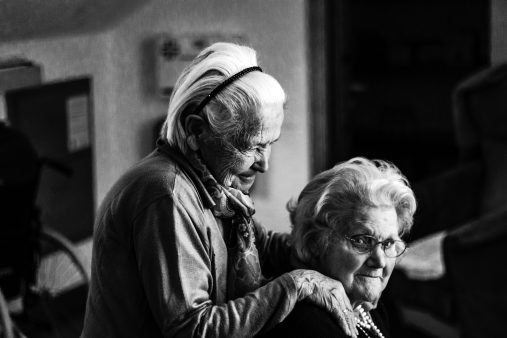Have we lost the idea of a critical friend?
27 July 2020
I sometimes wonder, in the age of online and offline echochambers and Facebook friendship bubbles, whether we have lost the ancient idea of a critical friend. I am as guilty here as anyone. I mercilessly unfriend people on Facebook whose views I find abhorrent (or even mildly disturbing), rather than engaging with them critically. There are not many Brexiteers left on my Facebook…
The notion of a ‘critical friend’ was paramount in Aristotle’s famous friendship theory – with the true friend being seen not only as a supporter but also a challenger. Otherwise the friendship degenerates into a complacent mutual admiration society. As Cicero (who shamelessly plundered Aristotle’s ideas about friendship) later put it, to ‘graciously give and receive criticism is the mark of true friendship’. Accepting criticism may even become a catalyst for profound epiphanic self-transformation. To accept, unquestioningly, the friend’s character flaws, without trying to correct them, is not a sign of true friendship but rather its opposite: an attitude that in today’s academic parlance would probably best be referred to as unhealthy ‘co-dependency’.
The critical engagement required by true friendship would, by Aristotle’s lights, be guided by a mutual recognition of objective normativity inherent in the world in which we live. While understanding a friend involves understanding that person’s unique self-narrative, it thus also involves understanding that narrative against the background of shared character-relevant values. C. S. Lewis’s old point on how, in painting, friends tend both to look ahead, whereas lovers stare into each other’s eyes, may be seen to represent friendship’s unique commitment to a common moral vision which is not only subjective, and not even relational in a dyadic sense, but lies beyond personal selfhood.
Speaking of ‘selfhood’ brings us to Aristotle’s much-cited locution of the friend as ‘another self’. Debates have raged about whether Aristotle meant this simply as a poetic metaphor (i.e., about being as close as one can be to another person), or whether he was making a psychological claim (about the nature of kindred-spiritedness) or even an ontological one (about selfhood being somehow a relational concept). I will avoid getting embroiled in those exegetical issues in this blog post and just focus on two of the educational implications that Aristotle’s locution is evidently meant to alert us to. To start with, here is the most relevant Aristotelian quotation:
Now we are not able to see what we are from ourselves […]; as when we wish to see our own face, we do so by looking into the mirror, in the same way when we wish to know ourselves we can obtain that knowledge by looking at our friend (1213a15–22).
Aristotle considered it of paramount interest (e.g. in terms of our potential character growth) that our views about who we are correspond to who we really are ‘deep down’. However, he realised that we are often lacking in self-transparency and need someone who knows us well to correct our self-conceptions. This is why contemporary neo-Aristotelians are sceptical of self-report instruments to ‘measure’ character and recommend peer-reports and other more objective measures for triangulation. So the first educational implication to be drawn from Aristotle’s self-theory is that friends are invaluable for self-knowledge in the sense that they (often) know us better than we do ourselves. For example, a friend is likely to notice much earlier than I do that I have lost my zest for life and am sinking into depression. In general, ‘we are able to observe our neighbours more than ourselves, and to observe their actions more than our own’ (1169b33–35).
However, there is a second and perhaps more controversial implication lurking inside the above citation. Because of the co-ordination and resonance of souls, involved in friendship, Aristotle clearly thinks that I can learn facts about myself – including my current state of character and its potential for growth – by looking at how my friends react and act, as their reactions are likely to mirror mine (although the latter will be opaque to my own introspection). So there are actually two reasons for why ‘the self-sufficing man will require friendship in order to know himself’ (1213a23–26).
I said that the second reason may be more controversial because it seems to assume that we have privileged access to an understanding of other people’s character traits – when we see those being exercised in action – that is somehow, in principle, unavailable in the case of our own traits, and that we can identify those viewed traits as being the same as, or different from, our own, although lack of direct self-knowledge prevents us from having immediate access to the self-traits with which we are meant to juxtapose the friend’s traits. Aristotle seems to forget here his own insistence on how good character is individually adjusted to persons’ different temperaments and social situations.
My qualms over the second of those implications notwithstanding, Aristotle does make a strong case for self-examination being dependent upon other-examination, and self-knowledge upon other-knowledge: in particular the intimate knowledge that the friend has of who I am. We are beings prone to self-deceptions and positive illusions about ourselves. Friends can correct for those, to a certain extent at least, either by direct criticism or simply by being there for us as a ‘mirror’ to look into.
To be sure, some of the ‘mirrors’ that we are forced to look into on Facebook present a distorted view of reality and many of our friends there are not deep friends in the Aristotelian sense. But might we still not learn something about ourselves by looking into them? Shall I count to ten before I unfriend my next Facebook friend – perhaps?
Photo by Eberhard Grossgasteiger “My mom and her protectress” on Unsplash
- April 2024
- March 2024
- February 2024
- January 2024
- December 2023
- November 2023
- October 2023
- September 2023
- August 2023
- July 2023
- June 2023
- May 2023
- April 2023
- March 2023
- February 2023
- January 2023
- December 2022
- November 2022
- October 2022
- September 2022
- August 2022
- July 2022
- June 2022
- May 2022
- April 2022
- March 2022
- February 2022
- January 2022
- December 2021
- November 2021
- October 2021
- September 2021
- August 2021
- July 2021
- June 2021
- May 2021
- April 2021
- March 2021
- February 2021
- January 2021
- December 2020
- November 2020
- October 2020
- September 2020
- August 2020
- July 2020
- June 2020
- May 2020
- April 2020
- March 2020
- February 2020
- January 2020
- December 2019
- November 2019
- October 2019
- September 2019
- August 2019
- July 2019
- June 2019
- May 2019
- April 2019
- March 2019
- February 2019
- January 2019
- December 2018
- November 2018
- October 2018
- September 2018
- August 2018
- July 2018
- June 2018
- May 2018
- April 2018
- March 2018
- February 2018
- January 2018
- December 2017
- November 2017
- October 2017
- September 2017
- August 2017
- July 2017
- June 2017
- May 2017

